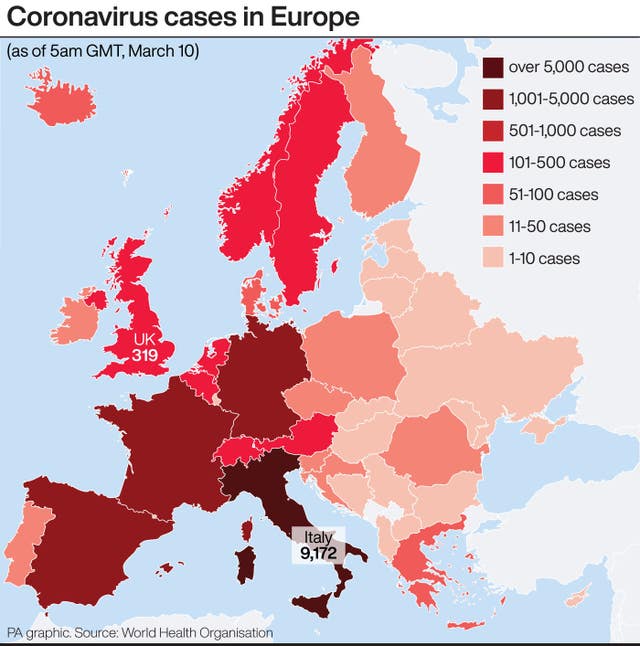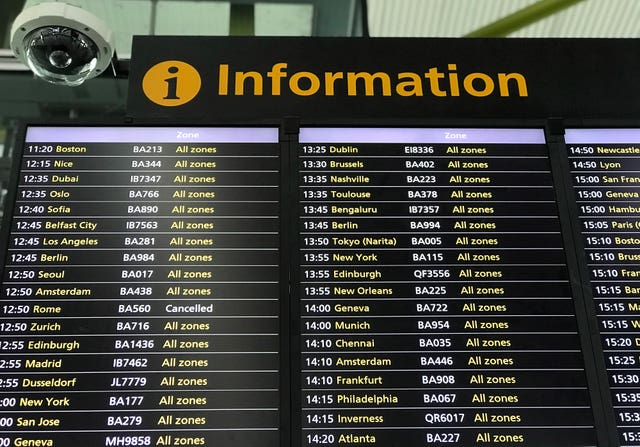
Hundreds of flights between the UK and Italy have been cancelled due to the coronavirus, leaving some passengers stranded.
British Airways has suspended all flights to and from Italy until various future dates depending on the route.
EasyJet has cancelled all flights touching Italy until April 4 but will operate “rescue flights” in the coming days to passengers who need to return home or whose travel is “essential”.
Ryanair said no flights will serve the country between Saturday and April 8.
British Airways refused refund requests to passengers booked on flights to Italian airports outside the north of the country until the Foreign and Commonwealth Office updated its travel advice on Monday night.
That means some passengers may have reluctantly travelled to Italy to avoid losing money and now face a struggle to get home.
One British passenger told the PA news agency she felt “dumped” by the airline after her flight from Rome to London was cancelled.
The woman, who asked not to be named, said she was seeking an “acknowledgement that they just stranded loads of passengers when they said they would get us home”.
The passenger went on: “Their website was down, their call centres are overloaded and we got an email after midnight saying our flight was cancelled. It’s putting more passengers in danger.”
She said she “had to fight” to secure a place on a Vueling flight.
Ryanair said passengers who need to fly home can switch to one of its flights which are operating up to and including Friday.

An airline spokesman said: “The situation is changing on a daily basis, and all passengers on flights affected by travel bans or cancellations are receiving emails and are being offered flight transfers, full refunds or travel credits.
“Ryanair apologises sincerely to all customers for these schedule disruptions, which are caused by national government restrictions and the latest decision of the Italian government to lock down the entire country to combat the Covid-19 virus.”
Ryanair reduced its passenger target for the 12 months to the end of March by three million to 154 million, but it does not expect this to have a “material impact” on profits.
ACI Europe, which represents European airports, said its “initial assessment” was that passenger numbers between January and March will drop 14% due to the coronavirus, with thousands of flights cancelled.
Director general Olivier Jankovec said: “The Covid-19 epidemic is turning into a shock of unprecedented proportions for our industry.”
Low cost carrier Norwegian has cancelled around 3,000 flights between mid-March and mid-June across all its routes, due to a drop in demand because of the coronavirus.
This represents approximately 15% of its capacity for this period.
The company has also put several other measures in place, including temporary layoffs of a “significant share of its workforce”.

Chief executive Jacob Schram said: “We encourage the authorities to immediately implement measures to imminently reduce the financial burden on the airlines in order to protect crucial infrastructure and jobs.”
European Commission president Ursula von der Leyen indicated on Tuesday that the European Union will relax rules which mean airlines face losing take-off and departure slots if they do not use them.
She described this as a “temporary measure” amid demand for air travel plummeting due to coronavirus.
It comes after Virgin Atlantic chief executive Shai Weiss claimed the airline was being “forced” to fly planes that are “almost empty” to avoid losing slots, which can be worth millions of pounds at capacity-constrained airports such as Heathrow.
Following Ms von der Leyen’s announcement, Mr Weiss said: “Prompt publishing of the legislation will allow the UK slot coordinator to act, enabling Virgin Atlantic and other airlines to operate schedules more efficiently and avoid flying almost empty planes for the sake of retaining valuable slots, which in turn creates unnecessary carbon emissions.”


Comments: Our rules
We want our comments to be a lively and valuable part of our community - a place where readers can debate and engage with the most important local issues. The ability to comment on our stories is a privilege, not a right, however, and that privilege may be withdrawn if it is abused or misused.
Please report any comments that break our rules.
Read the rules here